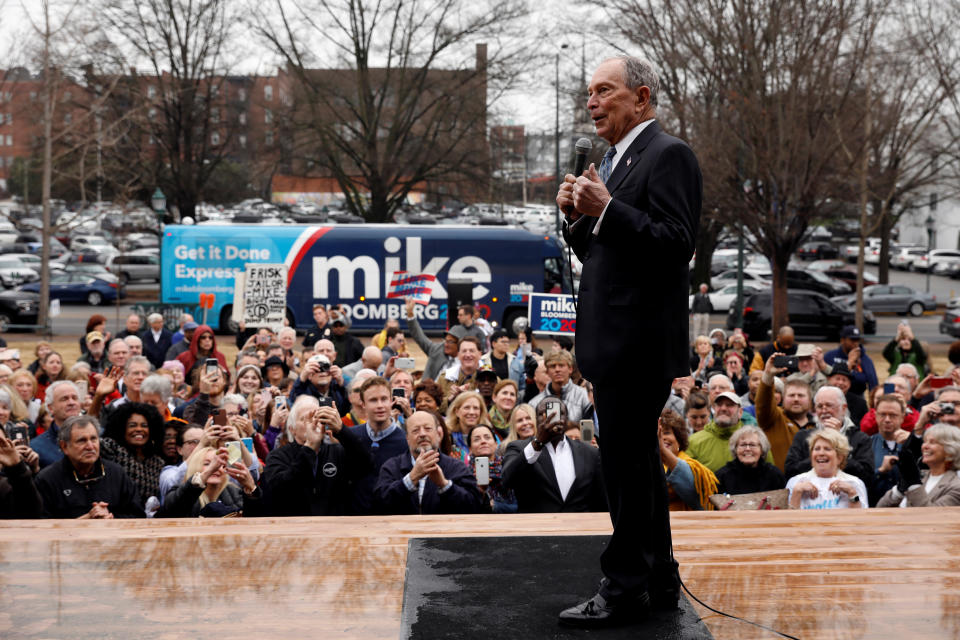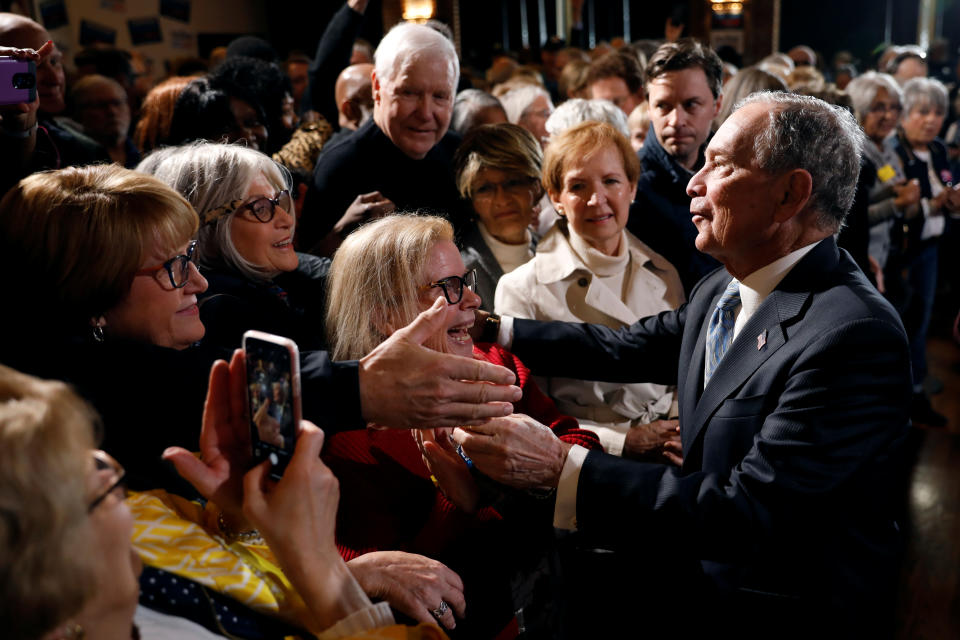Don't look back, Bernie — Bloomberg is gaining on you


On Tuesday night, a few short hours before Bernie Sanders won the most votes in the New Hampshire primary and a few short days after he’d won the most votes in Iowa, the high-profile New York Times columnist Tom Friedman published an opinion column under the following sub-headline:
“Democrats need to nominate the right person to prevent Trump from winning a second term.”
Just above that, Friedman’s main headline made it perfectly clear who he thinks the “right person” to beat President Trump is:
“Paging Mike Bloomberg.”
“In an age when political extremists go all the way, and moderates tend to just go away, Bloomberg has the right stuff — a moderate progressive with a heart of gold but the toughness of a rattlesnake — for what is going to be an incredibly big, brutal task,” Friedman argued, dismissing Sanders as a nonstarter.
“On which planet in the Milky Way galaxy is an avowed ‘socialist’ … going to defeat the Trump machine this year?” Friedman wrote.
The column — or endorsement, really — rocketed around social media in the hours after it appeared online. Moderate media figures trumpeted Friedman’s take, characterizing it as “excellent” and “exceedingly convincing.” Progressives, meanwhile, cited it as further evidence that the multibillionaire former New York mayor’s campaign is nothing but a media creation, and that Bloomberg himself has no real constituency outside of the green rooms of MSNBC and CNN and the quiet car of the Amtrak Acela train between Washington, D.C., and New York City.
Unsurprisingly, Friedman’s disclosure at the bottom of the column — “Bloomberg Philanthropies has donated to Planet Word, the museum my wife is building in Washington” — triggered tons of “aha!” tweets on the left. And even Trump got in on the act, telling reporters Tuesday that he “would rather run against Bloomberg than Bernie Sanders … because Sanders has real followers,” as opposed to Bloomberg, who is “just buying his way in.”

The problem with the argument that Bloomberg isn’t running a real campaign with real supporters, however, is that it isn’t true. And progressives — particularly those who want Sanders to win the Democratic nomination — ignore that at their peril.
To be sure, no one would be writing columns about Bloomberg if his net worth was $100,000 (like Pete Buttigieg’s) or even $1,000,000 (like Sanders’s). A fortune of $60 billion helps, especially if you spend more than $350 million of it on ads during the first few months of your campaign. When Bloomberg entered the race last November, he was polling at 3 percent nationally. Today he is approaching 15 percent. Each percentage point cost him about $30 million. As the New Republic recently put it, “Old people watch a lot of television. Old people vote. The best way to reach these voters is to get on TV and stay there.” Facebook, too: Over the past two weeks, Bloomberg spent an average of more than $1 million a day running ads on the social network — or five times more than Trump spent during the same period.
But Bloomberg’s strategy hasn’t been just expensive. It’s also been effective. That’s partly by chance and partly by design. The chance part is that Joe Biden, who has campaigned as the Democrat with the best odds of beating Trump, just collapsed in Iowa and New Hampshire, finishing fourth and fifth, respectively. (Biden ran for president twice before and has never finished higher than fourth place in a primary.) The design part is that Bloomberg’s campaign has always been premised on stepping in as the new Joe Biden if and when the actual Joe Biden collapses.
All seems to be going according to plan. Consider not just the cost but the content of Bloomberg’s ads. There’s the one with the flashing images of white supremacist protestors and smiling autocrats that ends with the hashtag #DumpTrump. There’s the one describing the “real state of the union” as “a nation divided by an angry, out-of-control president.” And there are a whole bunch of them contrasting the current occupant of the Oval Office with the pragmatic, moderate Bloomberg, who “brings people together,” “solves problems” and “gets it done.” Bloomberg has basically been skipping the primary and running a general election campaign as a way of convincing Democrats that he’s ready to take on Trump — much as Biden tried to do.
“I’m not running against Bernie Sanders,” Bloomberg said last week in Compton, Calif. “I’m running against Donald Trump.”

Consider, too, the voters Bloomberg has been going after: not just old people in general, but older black people specifically. While Bloomberg’s rivals battled it out in majority-white Iowa and New Hampshire, the former mayor — who has skipped the four early-voting states to focus on Super Tuesday — was free, as the Associated Press recently reported, to host a meeting with nearly 80 black pastors in Detroit; to deliver a speech before a black Democratic organization in Montgomery; to hold a rally at a historically black university; to tour Martin Luther King Jr.’s church; and to conduct an early-voting kickoff at an African-American museum.
All in the past two weeks.
Meanwhile, Bloomberg’s massive, data-driven marketing buys have included “spots on black radio stations, a Super Bowl ad that featured an African-American mother who lost her son to gun violence and a national ad touting his work with President Barack Obama on gun legislation and a teen jobs program.” This week he is holding rallies in Montgomery, Ala., Raleigh, N.C., and Chattanooga, Tenn. — key cities in key Super Tuesday states where African-American voters can decide a Democratic primary.
Bloomberg’s black outreach has not been free of controversy; just this week, audio recordings from 2015 surfaced on which the former mayor boasted about his controversial stop-and-frisk policing policy and made the provocative (and exaggerated) claim that “95 percent” of “murderers and murder victims” are “male minorities, 15 to 25.” (Bloomberg has since apologized for stop-and-frisk.)
But while younger black voters have bristled at Bloomberg’s criminal justice record, older black voters, who tend to vote more strategically than ideologically, seem increasingly drawn to his pitch of electability and competence — which is the same pitch that initially drew them to Biden. In a telling move, Georgia Rep. Lucy McBath, who ran for Congress in 2018 after her teenage son was shot to death in a car over a dispute about loud music, endorsed Bloomberg Wednesday, citing his record on gun violence prevention.
So it would be one thing if the only people backing Bloomberg were corporate, centrist media types like Friedman, with his familiar arguments about “job creators and risk-takers” and how Bloomberg built “one of the most admired global companies as a real C.E.O.”

But instead, Bloomberg’s coalition is beginning to look a lot like the one that kept Biden atop the polls for an entire year, before Iowa and New Hampshire burst his bubble. Mainstream Democrats obsessed with electability. Pragmatic older black voters. And moderates who aren’t down with Sanders’s “political revolution.” Since Iowa, Bloomberg has shot up 7 points nationally. Biden has fallen by an identical amount. At the same time, Biden has shed 22 points among black voters. Bloomberg has gained 15. Most of those gains have been concentrated among black voters over 45. Upon entering the race in November, Bloomberg’s net favorability (or the share of voters with favorable views minus those with unfavorable views) was just +5 among Democratic primary voters and +4 among black voters, according to Morning Consult. In the latest Morning Consult poll, he was at +40.
This doesn’t mean Bloomberg is a lock to secure the Democratic nomination. In fact, because of the delegate math, he may not have a path to winning that doesn’t tear the Democratic Party in two at what could be its first multiballot convention since 1952. But assuming Biden continues to implode — and assuming the other would-be anti-Bernies such as Buttigieg and Amy Klobuchar continue to split the moderate vote while failing to attract voters of color — then Bloomberg is perfectly positioned to sweep in on Super Tuesday and fill the big, Biden-shaped hole in the Democratic race. And to help fill it, he’ll have billions more in the bank than Biden, or any candidate in history, ever had.
Again, this was Bloomberg’s plan from the start. Sanders may have won the most votes in Iowa and New Hampshire. But soon enough he’ll have yet another rival to contend with — perhaps his strongest yet.

Read more from Yahoo News:
